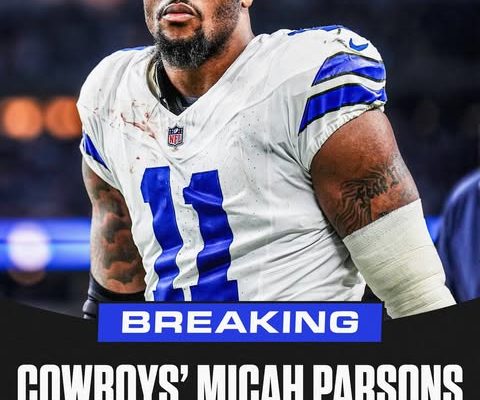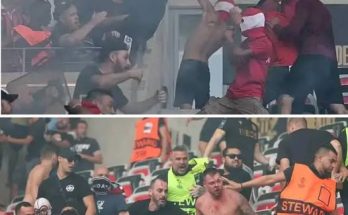The NFL landscape was shaken to its core today as Dallas Cowboys superstar Micah Parsons announced on social media that he has requested a trade from the franchise. The seismic news, which comes just as teams are fully immersed in the rigors of training camp, represents a stunning escalation in a contract standoff that has been simmering for months. Parsons, widely regarded as one of the most dominant defensive players in the league, detailed his frustrations in a lengthy and emotional post, citing a breakdown in communication, a lack of respect from the front office, and what he described as deliberate attempts to undermine him through the media. This is not just a negotiation tactic; it is a full-blown crisis for America’s Team, and one that puts its entire season and future in jeopardy.
The drama had been building for some time. Parsons, entering the final year of his rookie contract, has long been a candidate for a record-breaking extension. His on-field production since being drafted in 2021 has been nothing short of spectacular, putting him in a class with all-time greats like Reggie White for his sack production in his first four seasons. Yet, while other premier pass rushers around the league were signing massive deals, Parsons’ contract situation in Dallas remained unresolved. The public tension began to mount as both sides offered conflicting narratives. Parsons expressed a desire to remain a Cowboy, even stating he was willing to leave money on the table to get a deal done, but the front office, led by owner Jerry Jones, seemed to be dragging its feet.
The core of the issue, according to Parsons’ impassioned post, stems from the team’s handling of negotiations and their unwillingness to involve his agent, David Mulugheta. Parsons recounted a meeting with Jerry Jones earlier in the year that was supposed to be a discussion about leadership, but which he claims was turned into an informal contract talk by Jones. Parsons stated he engaged in the conversation but made it clear that any formal negotiations would need to go through his agent. What followed, he alleges, was a period of “radio silence,” with the team telling Mulugheta that a deal had already been reached with Parsons, a claim the All-Pro defender vehemently denies. This created a rift not just between the player and the team, but between the team and his agent, a dynamic that Parsons felt was disrespectful and unethical. He wrote, “I no longer want to be held to close-door negotiations without my agent present… I no longer want shots taken at me for getting injured while laying it on the line for the organization, our fans and my teammates.”
The social media post was an unfiltered look into the mind of a player who feels betrayed. He spoke of his love for the Cowboys, the team he and his father grew up cheering for, and his initial desire to be a Cowboy for life. However, he also detailed his frustration with what he perceived as a smear campaign, with narratives being created and spread to the media about him and his commitment. This, he suggested, was the final straw. The request for a trade was submitted directly to COO Stephen Jones, with Parsons concluding his message with the stark and unambiguous statement, “I no longer want to be here.”
The timing of this announcement could not be worse for the Dallas Cowboys. The team is just beginning training camp, a period meant for building chemistry, installing new schemes, and preparing for the season. Instead, they are now embroiled in a high-profile drama involving their best defensive player. The fallout has been immediate, with both players and pundits weighing in. Teammates, including stars like CeeDee Lamb, have shown their support for Parsons on social media, updating their profile pictures and posting messages of solidarity. This is a clear indication that the sentiment within the locker room may be siding with Parsons, a dangerous sign for a front office that prides itself on controlling the narrative. Former Cowboys players like Dez Bryant have also taken to social media, using their own experiences with the Jones family to add context to Parsons’ frustration. Bryant, who had his own share of contentious contract negotiations with the team, posted his support for Parsons, advising him to “stand your ground.”
The situation puts the Dallas front office, and particularly Jerry Jones, in an incredibly difficult position. Publicly, the team has not commented on the trade request, but Jones has previously dismissed the contract standoff as a routine part of the negotiation process, telling reporters “don’t lose any sleep over it.” This dismissive attitude, however, is likely one of the key factors that pushed Parsons to this point. While Jones is known for his hard-nosed negotiation style, the modern NFL landscape is different. Players, particularly generational talents like Parsons, have more power and a stronger voice than ever before. Social media provides them with a direct line of communication to the fanbase, allowing them to bypass the traditional media channels that the front office often uses to shape public opinion.
From a team perspective, trading Parsons seems unthinkable. He is not just a great player; he is a game-wrecker who can single-handedly change the outcome of a contest. He is the face of their defense and a marketable star who sells tickets and jerseys. The team has been built around his defensive prowess, and losing him would be a devastating blow to their Super Bowl aspirations. However, if Parsons is truly dug in and refuses to play without a new deal, the Cowboys would be faced with a choice: pay him a record-breaking amount and set a new precedent, or trade him for a haul of assets. The latter would be a monumental failure, as it would signal an inability to retain a homegrown superstar and would create a massive hole in the team’s roster.
The legal and contractual implications are also complex. Parsons is under contract for the upcoming season on his fifth-year option, a deal worth around $24 million. The team also has the option to use the franchise tag on him in the following two seasons, which would give them control for an additional two years. This gives the Cowboys significant leverage, but it also creates a situation where Parsons could resort to a holdout, incurring massive fines and potentially sitting out a significant portion of the season. Given his talent and marketability, many believe he would be willing to take that financial hit to force the team’s hand. The question of who has the most leverage in this high-stakes game of chicken is now the central question facing the Cowboys organization.
The situation has also opened up a frenzy of speculation about potential trade partners. While the Cowboys have no intention of trading Parsons at this time, other teams are undoubtedly monitoring the situation closely. A player of Parsons’ caliber would command an enormous trade package, likely including multiple first-round picks and other high-value assets. Teams with a strong defensive foundation and the necessary cap space, such as the San Francisco 49ers or the Los Angeles Chargers, are being discussed as potential landing spots. The thought of Parsons and Nick Bosa playing on the same defense is a terrifying prospect for the rest of the league. However, for now, the fate of Micah Parsons remains in the hands of the Dallas Cowboys, and the outcome of this standoff will have repercussions that echo throughout the NFL for years to come. It is a defining moment for the franchise, a test of its values, its leadership, and its ability to handle a crisis of its own making.



